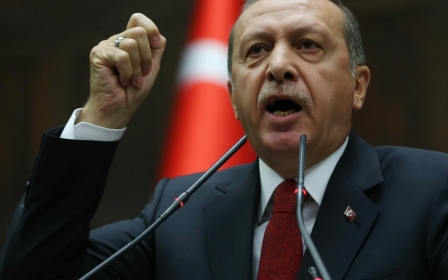Former Turkish President: we must raise 'certain standards' on women's rights

Turkey's former President Abdullah Gul acknowledged on Tuesday that his country could stand to improve its record on women's rights.
“We do have certain standards that we need to raise” he told an audience at Chatham House, the London-based think tank.
The admission comes a day after current Turkish President Recep Tayyip Erdogan, provoked controversy for arguing that equality between men and women “goes against the laws of nature.”
“Their characters, habits and physiques are different...you cannot place a mother breastfeeding her baby on an equal footing with men," Erdogan said.
While Gul did not refer to Erdogan's comments directly, he acknowledged that there was room for “improvement.”
“We should all remember democracy is a process of improvement, moving towards perfection” said Gul, who stepped down earlier this year.
Though initially seen as staunch allies in the conservative Justice and Development Party (AKP), rifts emerged between Erdogan and Gul towards the end of the latter's presidency.
Gul stood in opposition to a number of positions adopted by Erdogan while he was prime minister – praising the anti-government Gezi Park demonstrations in 2013 and defying a temporary ban on Twitter imposed by the AKP government.
Gul seemed reluctant to answer questions about whether the Turkish presidency should be awarded greater power - an increasingly important topic of debate in Turkey since Erdogan was elected.
I preferred a “parliamentarian” system to a presidential system, he said, while not elaborating further.
Writing in the Guardian, Turkish-British writer Alev Scott criticised Erdogan's comments on women as “deliberately polarising” and pointed to wider issues with the country's ruling establishment, noting that Gul had married his wife at 15.
“When he appeals to the conservative instincts of a country grappling with entrenched patriarchy and inequality and assures his listeners that 'equality in justice' is what matters most, not real equality – how does that help Turkish women, men and their children?” she wrote.
“He's president of a country of 75 million people where only 28 percent of women are in legal employment, an estimated 40 percent of women suffer domestic violence at least once in their lives, and where millions of girls are forced into under-age marriage every year.”
Stay informed with MEE's newsletters
Sign up to get the latest alerts, insights and analysis, starting with Turkey Unpacked
Middle East Eye delivers independent and unrivalled coverage and analysis of the Middle East, North Africa and beyond. To learn more about republishing this content and the associated fees, please fill out this form. More about MEE can be found here.




